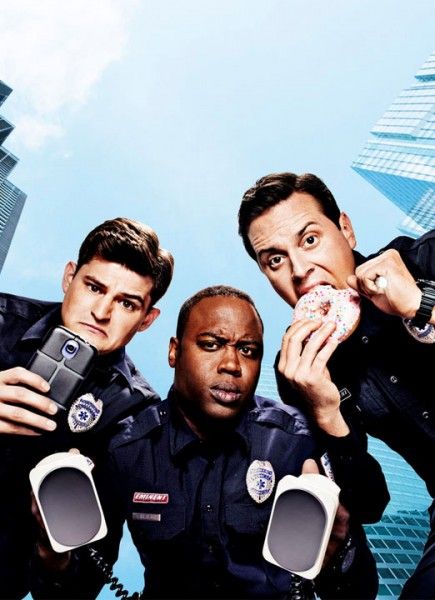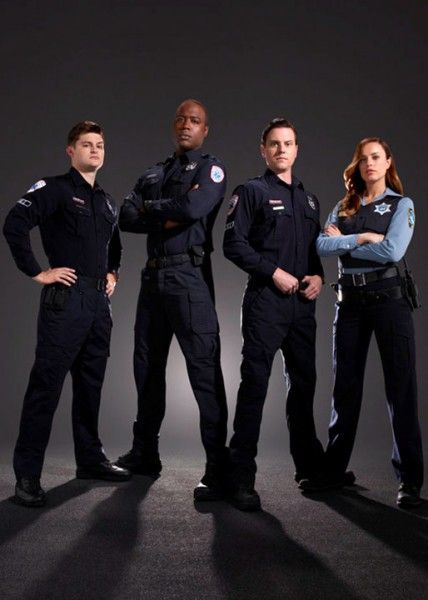There are several levels of distillation that have brought us to Sirens, a new comedy on USA produced by Denis Leary (Rescue Me) and Bob Fisher (Wedding Crashers). It is based loosely on a U.K. series of the same name, that ran for a single season in 2011, that itself was based off of the book Blood, Sweat & Tea, which was a compilation of posts from the blog "Random Acts of Reality." In some cases, the continual processing of something can lead to it being polished and refined. In other cases, it causes it to loose its natural content and value. To see exactly where Sirens falls, hit the jump.
As I mentioned in my review of NBC's new comedy About A Boy -- itself an adaptation of both a book and a movie -- an adaptation can either go for authenticity, or it should consider the source material from an entirely new perspective (like Sherlock or Elementary have done with the forever-replicated and adapted works of Conan Doyle). Like NBC's About A Boy, Sirens pays some passing, almost unrecognizable homage, to some of the material on which it is based, before abandoning it completely in favor of a different approach. It takes both series a few episodes to start to find themselves, but in both cases, the transformation is much more promising than the initial offering.
Sirens stars Michael Mosley (Pan Am), Kevin Daniels (Modern Family) and Kevin Bigley (Bones) as three Chicago EMTs who appear to take a casual and irreverent approach to their work, but are ultimately devoted to it, and to their friendships. Like the previous adaptations, the 30-minute comedy (which will run for ten episodes) also devotes a large portion of its time to the personal lives of the leads, particular Mosley's Johnny, the de facto leader of the trio, who is in a very close relationship with his ex-girlfriend, Theresa (Jessica McNamee), a cop.
Personally, when watching USA's version of Sirens, it was difficult to divorce myself from the memory of the U.K. series, which was manic, innovative, heartbreaking, and difficult to shake. It also featured a killer soundtrack. Tonally, it was all over the place, but what sold it was the strength of the leads (played by Rhys Thomas, Kayvan Novak and Game of Thrones' Richard Madden), their natural chemistry, and the series' devotion to showing the emotions of their work. In that hour-long show, death really meant something, and while how it affected the characters could later be played for laughs as they struggled to repress their feelings, it ultimately made a great point about dealing with grief.
On USA's Sirens, people flatline, and there's hardly a notice or another mention of them. Though the show does delve into some issues of repression, plots fly by quickly. In the second episode, Johnny is forced to confront his feelings about his father abandoning him and his mother to marry a stripper when he was young. It's an issue that was multi-episodic in the original series, but here, it's solved quickly and superficially, owing almost entirely to a lie told long ago by his mother.
Overall, despite Sirens' obsession with cursing (if there is a limit for how many "goddamns" and "shits" can be uttered in half an hour, they definitely hit it) and sophomoric obsessions with porn and dick size, it does occasionally hit some homers with its jokes and setups. Bill Nunn (Spiderman) in particular, who plays their boss Cash, steals all of his scenes with his measured, off-beat wisdom, and his obsession with eating cold Twix (he also calls Brian "Kevin," which is a meta joke about the actor's real name). Sirens also does an admirable job when it comes to race in Chicago, and some of the dialogue regarding that is, so far, some of the series' best. "You don't know if you're looking for a Catherine with a C or a K," Johnny says to his cohorts, as Brian (Bigley) wants to search for a women mentioned in a dying man's last request. "And you know there's a black girl out there spelling it with a Q." "We do love our Qs," Hank (Daniels) says. "Except for Kwanza … we really dropped the ball on that one."
Sirens seems set, so far, to allow Hank to be the non-cliched gay character that Ashley (Madden) was in the U.K.'s series, but where it falls down is with its women characters. The stand-out of the British series was cop Maxine (Amy Beth Hayes), who talked tough, but was incredibly vulnerable. The show devoted a lot of time to her plots separately, rather than always including her with the boys (whereas Theresa seems to only matter or exist in terms of being Johnny's best friend and ex -- and why he would break up with her in the first place makes no sense and isn't addressed). Maxine was, unequivocally, one of the best-written and most impressively portrayed women on television, and it's disappointing that that seems to be one of the biggest things this incarnation of Sirens has dropped.
Ultimately though, Sirens is at least a different kind of comedy and emergency services show. Different doesn't automatically mean good, but there's potential here. By its third episode, Sirens has a much better sense of itself: where it wants to go, and how it wants to differentiate itself from its source material. Though the personalities of the leads (particularly Brian, who comes off as too stiff and doesn't have great chemistry with his co-stars) could use some more development, if it keeps improving each week as it seems to so far, it might have a fighting chance.
Sirens premieres Thursday, March 6th at 10 p.m. on USA.



